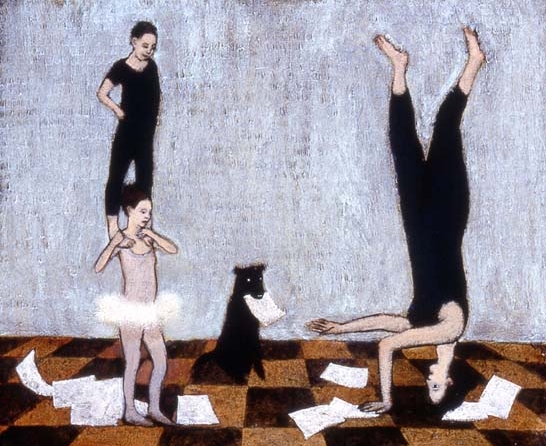Commissions are hard for me. I do not disapprove of artists accepting commissions. They just don't work very well for me. My work needs to be mine until we are done with each other. When work is commissioned, it is never clearly mine from the start and my engagement with the piece is threatened. The best transactions occur when I have made work that is vital for me and the purchaser has found it to be vital to them, often for very different reasons. When I am trying to craft something that will be vital for anyone else, I struggle to maintain a connection to the core of the work, and the painting suffers. It's not that I never accept commissions (although that is almost actually true); rather when I do, the terms have to preserve my connection to the work. If this sounds tricky, it's because it is. If you think you might want to proceed, work through one of my galleries or agents. I work with great people. They know my idiosyncrasies and will help you refine your request and protect my studio space from too frequent intrusion. Here's how that might go:
1. A collector needs a piece that requires certain dimensions I don't normally work in (I am not likely to consider a commission for a standard size easel painting). They know such a painting doesn't exist, because they've already contacted both my galleries and checked on available work. After becoming familiar with the cost of such a project (see 4. below), the commissioners ask the gallery to approach me with their peculiar size requirement. Requests with more specifications (such as including a little blond girl, or a portrait of the family dog, or this building, or a family of six with two sons and two daughters) is not going to be considered. A sample request might look like this: 'I need a piece that is about three feet high and nine feet wide. I tend to prefer Brian's more sparsely populated compositions. Here are a few examples from his online archive of pieces that I love...'
2. If I agree to undertake a project (the parameters aren't too constricting, I have enough time to take on one more thing, etc), I submit painting studies through my gallery that I am interested in exploring in a larger format. The commissioner participates in selecting which will come about-- but understanding that the idea must be free to evolve in my studio, and that this is not an opportunity for them to pick and choose details (combining elements from the studies, or requesting that this is added or that is changed to this). They like a study or they don't, and are free to opt out of the process at any time.
3. If I proceed to the point that I am painting the piece, I'll need two things from the commissioner: time and space. My commissioners must be prepared to wait. My exhibition schedule is full. I must work such requests into a busy calendar. A year is not out of the question. Longer is not unheard of. As for space, please understand that intrusion into my studio space is not a problem because I find it unpleasant--rather I tend to enjoy it, but I don't get any work done. This is why I do two open houses a year which are announced on my website. Please register for email announcements and come to the open house.
4. When work is finished, the commissioner is given first right of refusal through the gallery. No pressure-- if the collector doesn't love the piece, I've created something I love and my galleries will sell it. I resist advanced payments because I need the freedom to do whatever I feel is necessary to make good work, whether or not it pleases the client. Please also note that commissions are likely to be more costly than existing pieces of similar size or dimension, because of the extra time and effort involved in creating them.
Understand that as an artist I must always be reaching forward, and commissions tend to be pulling back to a version of something I have already done. Too much of that pullback threatens the progress of my journey into the next exploration, which is what gives my body of work vitality. If my work suffers, it impacts the value of my collectors' investments in my work. The closer I can be to unfettered exploration, the better the likelihood of a satisfying outcome for all parties. So then, where possible, I recommend people wait until they find what they like.
